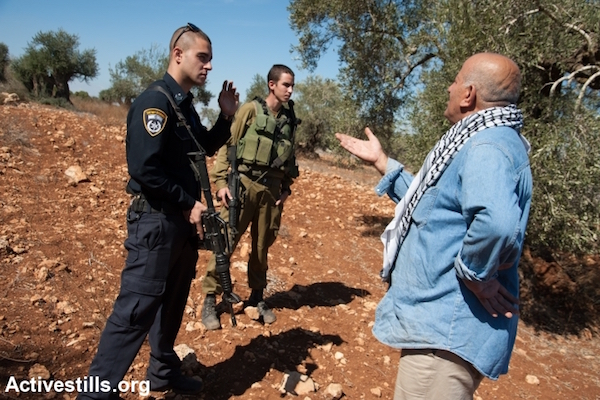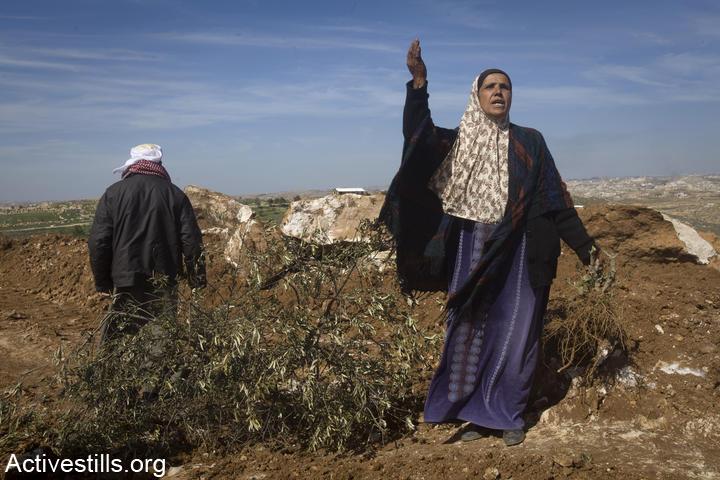Data shows that the police simply cannot prevent Israeli felons from ruining the yearly Palestinian olive harvest.
By Yesh Din, written by Yossi Gurvitz

Yesh Din recently published our yearly datasheet, which tracks the lack in law enforcement in the West Bank when it comes to Israeli civilians harming Palestinians and damaging their property. The 2015 datasheet looks rather familiar to the 2014 one, which in turns looks all too similar to the 2013 one. All in all, a chronicle of a failure foretold.
Between 2005-2015, Yesh Din followed 1,104 ideologically-motivated crimes in the West Bank. The rate of failure in solving the cases stands at 84.9 percent; that rate climbs to 90.5 percent when it comes to felonies against Palestinians’ property, and goes down to about 80 percent when it comes to violence against Palestinians themselves.
The most popular clause for closing cases is UP (Unknown Perpetrator), meaning the police have no suspects in mind; 624 cases have been closed using this clause. We have shown here time and again that the police have a tendency to close cases under the UP clause even when the felon is known to them. The second clause is lack of sufficient evidence, which as led to the closure of 208 cases.
There are two prominent findings in the current datasheet. The first is a follow-up of 104 ideological crimes that took place inside Palestinian villages. Most of the cases we document take place outside the towns and villages, many of them on agricultural land belonging to Palestinians. But in the last two years, we have seen more and more felonies taking place inside the towns and villages themselves, and here a spike is noted.
Between early 2013 and August 2014, Yesh Din recorded 45 incidents of assault or property damage within Palestinian towns; between August 2014 and August 2015, 44 such incidents were recording – a rise of almost 98 percent. Attacks within the towns, of course, carry with them significant psychological implications: the Palestinians learn they are not safe anywhere — not even in their own homes.

The most familiar incident is the murder of three members of the Dawabshe family in Duma on July 31st. But aside from the unusually grave outcome, the Duma attack is certainly not the only case of its kind. In fact, that very night at Duma, the killers attacked two houses. Fortunately, one of them was empty.
Aside from that, before the Duma attack Yesh Din recorded 15 cases of arson against Palestinian houses (another case was documented after the Duma attack). The Israeli media generally refers to these “price tag” attacks as if they were mere acts of graffiti. In practice, however, price tag graffiti almost always follows an arson attack.
A significant number of the attacks on Palestinian towns take place in Area B, which are under Israeli military control. In practice, the IDF does not fulfill its obligation under either international law or the decisions of Israel’s High Court of Justice, and does not protect the Palestinian residents. When the Palestinians attempt to organize civil defense groups, the Shin Bet promptly disbands them.
Needless to say, the Palestinian police are prevented from dealing with Israeli lawbreakers. The result is that many Palestinian towns are offered no protection from Israeli felons and arsonists — despite being under Israeli control. Not something to be particularly proud of, I guess.
The second point, especially in these days as Palestinians take part in the annual olive harvest, is that the Israeli police particularly fail when it comes to cracking cases of attacks on Palestinian trees and harvests. The positive news is that whereas the 2013 failure rate was 97.4 percent, this year it is “merely” 95.6 percent. I doubt this is of any consolation to the victims.
Israeli criminal activity expressed in damaging trees and harvests is ideological crime par excellence for two reasons. The first is the strategic goal of agricultural terrorism: remove Palestinians from their land. You can cultivate the land and mock the criminals, but you will bring home no harvest. Take our word for it. It will be burned down or stolen. Is it worth it, all this effort, just to see it all burn away or be uprooted? Forget about it, whispers the smoke, go away. Get thee out of thy country, and from thy kindred, and from thy father’s house.
And the abandoned land becomes after time, of course, land taken over by the felons. That is not something to be overly proud of.
Written by Yossi Gurvitz in his capacity as a blogger for Yesh Din, Volunteers for Human Rights. A version of this post was first published on Yesh Din’s blog.

